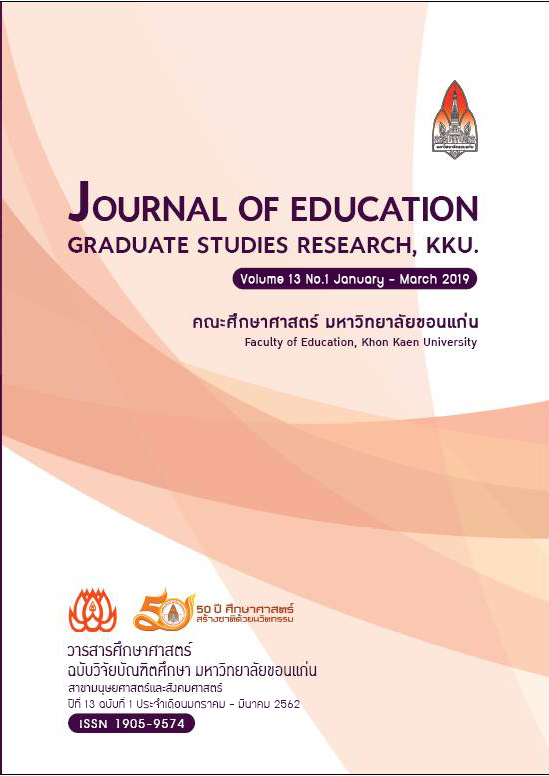Socio-Demographic Attributes and Aptitude on Grade 9 Students of Central Mindanao University Laboratory High School as Determinants of Chemistry Performance: A Causal Model
Main Article Content
Abstract
This paper geared to develop a causal model of the socio-demographic attributes and aptitudes on students’ performance in Chemistry at the CMU- Laboratory High School. The study employed descriptive-correlational and causal-comparative research designs. Results showed that the High School Admission Test score, type of elementary school graduated and the elementary average grade were significant predictors of the students Chemistry performance while gender, parents’ educational attainment and nature of commuting have no effect. The best fitting causal model of high school performance in Chemistry is best anchored on the aptitude levels as manifested by the Admission Test scores and elementary average grade, duly supported with the type elementary school graduated, gender and commuting scheme of students.
Article Details
References
Agbaje, R. O., & Alake, E. M. (2014). Students’ variables as predictor of secondary school students’ academic achievement in science subjects. International Journal of Academic Research and Publications, 4(9), 1-5.
Abante, Glenda M. (2014). School Readiness, Classroom Practice and Learning Engagement: A Causal Model on Kindergarten Pupil’s Performance. Unpublished Doctoral Thesis.
Abubakar, R. B., & Oguguo, O. D. (2011). Age and Gender as Predictors of Academic Achievement of College Mathematics and Science Students. Proceedings of the 2011 International Conference on Teaching, Learning and Change, 736-742.
Adeyemi, A-M., Adeyemi, S-U. (2014). Personal factors as predictors of students’ academic achievement in colleges of education in South Western Niigeria. Educational Research and Reviews, 9(4), 97-109.
Adika, L. O. (2015). Comparative Analysis of Social Studies Academic Achievement of Private and Public Junior Secondary Schools’ Students in Ibadan North Local Government Area of Oyo State, Nigeria. Journal of Capital Development in Behavioural Sciences, 3(1), 1-161.
Akhtar, Zarina. (2012). Socio-economic Status Factors affecting the Students Achievement: A Predictive Study. International Journal of Social Sciences and Education, 1(2).
Asparin, Ariel A. Problem Solving Abilities and Psychological Attributes of Sophomore Students: A Causal Model on Mathematics Achievement. Unpublished masteral thesis.
Ayodele M. O., Adedayo J. O., & Ayeni M. F. (2014). Predictive Power of Selected Variables on Students’ Academic Achievement in Integrated Science. Greener Journal of Educational Research, 4(3), 85-90.
Bhattacharyya, P. (2015). A study on consistency of performance of students in combined entrance examination (assam), board examinations in bachelor of engineering programme. International Journal of Research in Social Sciences and Humanities, 6(1), 44-52.
Carter, C. S. and Brickhouse, M. W. (1989). What Makes Chemistry Difficult? Alternate Perceptions, Journal of Chemical Education, 66(3), 223-225.
Cardellini, L. (2012). Chemistry: Why the Subject is Difficult? áreas emergentes de la educación química, 232, 6, Retrieved from http:www.educacionquimica.info/include/downloadfile.php?pdf=pdf1320.pdf
Chen, Q. (2009). Family Background, Ability and Student Achievement in Rural China - Identifying the Effects of Unobservable Ability Using Famine- Generated Instruments. http://repository.upenn.edu/gansupapers/26
Christian, Mathew. (2014). Learning Strategies, Age, Gender and School-location as Predictors of Students’ Achievement in Chemistry in Rivers State, Nigeria. Research on Humanities and Social Sciences, 4(21), 123-123.
Demircioglu, H. & Norman, N. Effects of some variable on chemistry achievement and chemistry-related altitudes of high school students. Hacettepe University, Egitim, 1999, 16-17; 40-44.
Espenshade, J. T and Chung, C. Y. (2010). Standardized Admission Tests, College Performance, and Campus Diversity. Office of Population Research Princeton University, 1-41.
Hijazi, T. & Naqvi, R. (2006). Factors effecting student’s performance: A case of private colleges. Bangladesh. Journal of Sociology, 3(1), 1-10.
Kyoshaba, M. 2009. Factors affecting academic performance of undergraduate students at Uganda Christian University. Unpublished Masteral Thesis.
Murshid, Khalid R. (2013). The predictive value of individual admission criteria on academic performance in a Saudi medical college. Journal of Taibah University Medical Sciences, 8(1), 18–23.
Oginni, A.M., Awobodu, Alaka, M.O and Saibu, S.L. (2013). School factors as correlates of students’ achievement in chemistry. International Journal for Cross-Disciplinary Subjects in Education (IJCDSE), Special Issue, 3(3), 1516-1523.
Okereke, Chinwe. (2011). Influence of gender, school location and the use of play-simulation on school achievement in chemistry.JORIND 1(9). Http://www.transcampus.org/journals
Olude, A.S. (2005). Effects of school type on students’ achievement in chemistry. Unpublished B.Sc. Ed Project Lagos State University, Lagos.
Robi, Yoseph Shumi. (2015). Determinants of Freshman CGPA: High School Result, Entrance Exam Result and EGSECE GPA. International Journal of Psychology and Behavioral Science, 5(3), 121-127.
Saifi, S. & Mehmood, T. (2011). Effects of socio-economic status on students achievement. International Journal of Social Sciences and Education, 1(2), 119-128.
Tai, R.H., Sadler, P.M., Loehr, J.F. (2005). Factors Influencing Success in Introductory College Chemistry. Journal of Research in Science Teaching, 42(9), 987-1012.
Udida, L.A. Ukwayi, J.K., Ogodo, & Agwanyang F. (2012). Parental Socioeconomic Background as a Determinant of Student’s Academic Performance in Selected Public Secondary Schools in Calabar Municipal Local Government Area, Cross River State, Nigeria. Journal of Education and Practice, 3(2), 129-135.
Woldeamanuel, Atagana, A. and Engida T. (2014). What Makes Chemistry Difficult? African Journal of Chemical Education, 4(2), 31-43.

